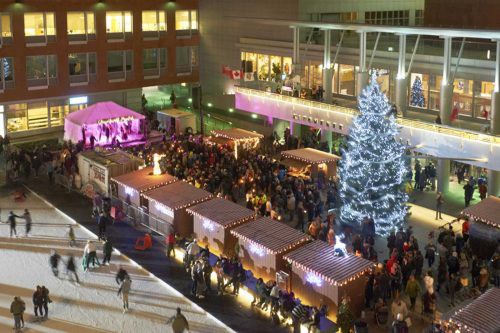2 min read
Written by Rachael Chong
Part 1 of a 3-part series about neighbourhood markets in Waterloo Region

St. Jacobs Market. Kitchener Market. Elmira Farmer’s Market. Cambridge Farmer’s Market. Christkindl Mkt. Uptown Waterloo Night Market. All the church bazaars and sales. Almost every festival in our region — from Kitchener’s Multicultural Festival to the Wellesley Apple Butter & Cheese Fesitval to the New Hamburg Mennonite Relief Sale — has an open air street market.
We have so many of them — What is it about markets that Waterloo Region loves so much? Walking around with heavy items in stifling crowds, scrounging for limited seating to finally tuck into rapidly cooling fried food, realizing you can’t buy anything because you don’t have cash — why?
Maybe because:
1. Markets offer a shopping experience often missing in larger sale food retail outlets — a chance to connect on a personal level with the vendor or producer.
2. Though recent media coverage has brought attention to the myth that all produce sold at markets is necessarily locally-grown, markets can provide an important revenue stream for all the vendors, whether they are re-sellers, food & drink establishments, or local farmers.
3. They are public spaces, where neighbours can run into neighbours, and where there is a positive buzz that can contribute to community identity. This idea is one of the findings that came out of City of Kitchener’s community-based research initiative, called Love My Hood.
4. Markets can provide access to food in food deserts. A food desert is an area where access to healthy, fresh produce is limited. In 2006, Region of Waterloo Public Health conducted a study to find out where food deserts were located within its borders, and whether small, localized neighbourhood markets could be part of providing food access while contributing to community development and spirit. It was out of this study that the Highland-Stirling Community Market was started.
Over the last decade, regional and municipal governments have worked on initiatives promoting localized neighbourhood markets for reasons of improving food access, and community development.
Stay tuned to future posts by Rachael as she covers some of these past and current initiatives!
Links:
Erin Nelson (2011). “Waterloo Region Neighbourhood Market Initiative” Initiative. http://nourishingontario.ca/waterloo-markets/
City of Kitchener.
https://www.lovemyhood.ca/en/cool-ideas/neighbourhood-markets.aspx

